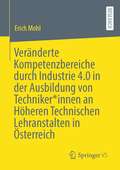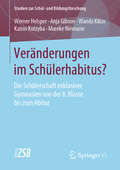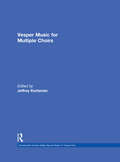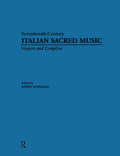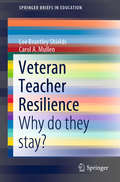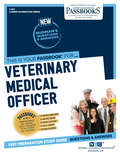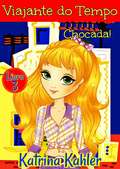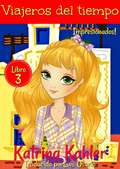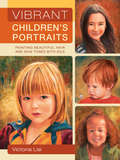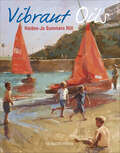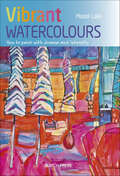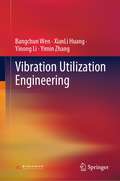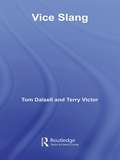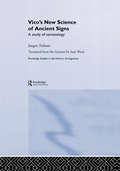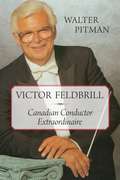- Table View
- List View
Verzorgen van barenden, kraamvrouwen en pasgeborenen: Werkcahier Kwalificatieniveau 3 311 (Skillslab-serie)
by Hogeschool van Arnhem en Nijmegen Diana Dekker Heleen GoedegebuurDit werkcahier besteedt aandacht aan de (aanstaande) moeder en de pasgeborene. Van de kraamverzorgende wordt verwacht dat zij de behoefte en de noodzaak van informatie en advies kan inschatten en die op de juiste wijze kan verwoorden. Dit vooral met betrekking tot de persoonlijke verzorging vaan de kraamvrouw en de baby de begeleiding rondom borstvoeding en flesvoeding, en vragen over het slapen en huilen van de pasgeborene.
Veränderte Kompetenzbereiche durch Industrie 4.0 in der Ausbildung von Techniker*innen an Höheren Technischen Lehranstalten in Österreich
by Erich MohlDie empirische Erhebung der quantitativen Lehrer*innen-Studie (n=1650) an österreichischen Höheren Technischen Lehranstalten (HTL) befasst sich mit dem Thema Industrie 4.0/ Digitalisierung und hat fachtheoretische/-praktische sowie allgemeinbildende Lehrer*innen der Fachrichtungen Maschinenbau, Mechatronik, Bautechnik, Elektrotechnik, Elektronik und Informatik im Fokus. Themenschwerpunkte sind dabei neue Anforderungen an das Wissenspotential/an die Wissensexpertise von Lehrkräften durch Industrie 4.0/Digitalisierung, deren Stellenwert in der HTL-Ausbildung sowie die sich verändernde Kompetenzförderung durch Industrie 4.0/ Digitalisierung aus der Sichtweise von HTL-Lehrkräften.
Veränderungen im Schülerhabitus?: Die Schülerschaft exklusiver Gymnasien von der 8. Klasse bis zum Abitur (Studien zur Schul- und Bildungsforschung #82)
by Werner Helsper Anja Gibson Katrin Kotzyba Mareke Niemann Wanda KiliasIn dem Band stehen exklusive Gymnasien und deren Schülerschaft im Zentrum .Damit wird erstens ein Blick auf Bildungsungleichheit in privilegierten Bildungs- und Lebenslagen geworfen und danach gefragt, ob eine Privilegierung bereits Privilegierter vorliegt. Zweitens wird die Entwicklung der Schülerhabitus an exklusiven und an Kontrastgymnasien in einem qualitativen Längsschnitt von der 8. Klasse bis zum Abitur rekonstruiert. Welche Typen des Schülerhabitus finden sich in exklusiven Gymnasien und Kontrastgymnasien? Und zeigen sich im Verlauf der Schülerbiographie Veränderungen oder dominiert die Reproduktion von Orientierungen und Praxen des Schülerhabitus?
Vesper and Compline Music for Multiple Choirs (Seventeenth Century Italian Sacred Music in Twenty Five #20)
by Jeffrey KurtzmanClassics of seventeenth-century Italian sacred music set in modern notation, this third part of Vesper and Compline Music for Multiple Choirs features works by Giacomo Giacobbi, Viriglio Mazzochi, Tarquinio Merula and Francesco Soriano.
Vesper and Compline Music for Multiple Choirs (Seventeenth Century Italian Sacred Music in Twenty Five)
by Jeffrey KurtzmanClassics of seventeenth-century Italian sacred music set in modern notation, this second part of Vesper and Compline Music for Multiple Choirs features works by Francesco Cavalli, Giovanni Legrenzi, Natale Monferrato, Agostino Steffani, Lorenzo Penna, Giovanni Paolo Colonna and Giovanni Paolo Colonna.
Veteran Teacher Resilience: Why do they stay? (SpringerBriefs in Education)
by Carol A. Mullen Lee Brantley ShieldsThis book explores why veteran teachers choose to remain in the classroom, making teaching their life’s career. The authors felt compelled to interview veteran teachers to learn about their experiences, how they make meaning of their classrooms and schools, and in particular what can be known about the adversities they face and their resilience. Factors (individual and contextual) are uncovered that influence veteran teacher’s resiliency and adaptation from veteran teachers’ perspectives and the literature. Induction programs, professional development, and mentoring are also examined for their importance to the interviews and education.Features of this book include:Focuses on veteran teacher resilience and why veteran teachers choose to remain in the classroom and teaching professionUses an interview method involving veteran teachers that illuminates issues of resiliency and retention from their perspectiveHighlights 15 narrative accounts of veteran teachers tailored to their perceptions, experiences, and strategies for navigating barriers and overcoming challengeCombines conceptual frameworks, research results, interventions, and strategiesConnects implications of the study and suggestions for future research to practice and policy This book is for researchers interested in teacher resilience, particularly veteran teacher resilience and the study and development of it, as well as practitioners drawn to the same topic, with applicability to their fields. Anyone interested in resilience, particularly within demanding professional contexts and stressful situations, should find value. "The focus on teacher resilience is original and it is an important aspect of why teachers might choose to stay in the profession. Teacher resilience is understudied and should provide useful knowledge to policymakers and education leaders on how to improve working conditions and increase efficacy. So much ink is spilled extolling why teachers exit the profession--there is a dearth of research on why they stay, which in my opinion is even more important than why they leave. This book makes an important contribution to the literature and will hopefully inform policy making and inspire others to conduct research on the subject." Christopher H. Tienken, Associate Professor, Dept. of Education Leadership Management and Policy, Seton Hall University, South Orange, NJ, USA "The topic is original. It seems there is much literature on new teachers and why they leave, but little on veteran teachers and why they stay. The topic and the reporting of the findings with suggestions for practices to be implemented in university programs as well as in K-12 schools is very useful. The format this book follows is actually a strong one for other researchers and students in doctoral programs." Sandra Harris, Professor Emerita, Educational Leadership, Lamar University, Beaumont, Texas, USA
Veterinary Medical Officer: Passbooks Study Guide (Career Examination Series)
by National Learning CorporationThe Veterinary Medical Officer Passbook® prepares you for your test by allowing you to take practice exams in the subjects you need to study. It provides hundreds of questions and answers in the areas that will likely be covered on your upcoming exam.
Via Afrika Ditlhangwa tsa setso Setswana Puo ya Gae Mophato 12: UBC contracted
by Batlhami Gape Leeuw Botsang Lekome Christopher MooaA o batla go ikitse? A o batlana le setlhangwa se se ka tsosolosang boleng jwa kitso ya tlholego mo go wena? A o batla go falola marematlou a gago ka dipholo tse di tsabakelang dinaledi? Fa go le jalo se etsaetsege, setlhangwa sa rona sa setso sa `Via Afrika` Mophato 12, se teng go go tlhaba matlhale-dinaane tse di supang boitlhamedi jo bo manontlhotlho, tse di lepalepanang le dinako, ditshwantsho tse di tlhapileng jaaka dinaledi, maboko a a gakololang motho setso sa gagwe, puo e e nopolegang ya diane le maele mmogo le dithamalakwane tsa maloba, maabane le gompieno. Botlhokwa jwa buka e go Motswana mongwe le mongwe yo o ipelang ka puo ya gaabo, e e leng letlotlo la polokelo ya botlhokwa ya melao le setso, bo ka se lekanngwe le sepe. E dire karolo ya loeto lwa botshelo jwa gago, o somarela puo le ngwao tsa gaeno. Tsotlhe tse, di tlhagisiwa ka thulaganyo e e sa tseiseng ope sedidi, ka dipotso tsa boleng jo bo kwa godimo. Setlhangwa se, se arabela ka botlalo ditlhokego tsa Pegelo ya Pholisi ya Kharikhulamo le Tlhatlhobo. Ga se setlhangwa sa barutwana kwa dikolong fela, ke sa motho mang kgotsa mang yo o nyoretsweng go ikitse.
Via Afrika Ditlhangwa tsa setso Setswana Puo ya Gae Mophato 12: UBC uncontracted
by Batlhami Gape Leeuw Botsang Lekome Christopher MooaA o batla go ikitse? A o batlana le setlhangwa se se ka tsosolosang boleng jwa kitso ya tlholego mo go wena? A o batla go falola marematlou a gago ka dipholo tse di tsabakelang dinaledi? Fa go le jalo se etsaetsege, setlhangwa sa rona sa setso sa `Via Afrika` Mophato 12, se teng go go tlhaba matlhale-dinaane tse di supang boitlhamedi jo bo manontlhotlho, tse di lepalepanang le dinako, ditshwantsho tse di tlhapileng jaaka dinaledi, maboko a a gakololang motho setso sa gagwe, puo e e nopolegang ya diane le maele mmogo le dithamalakwane tsa maloba, maabane le gompieno. Botlhokwa jwa buka e go Motswana mongwe le mongwe yo o ipelang ka puo ya gaabo, e e leng letlotlo la polokelo ya botlhokwa ya melao le setso, bo ka se lekanngwe le sepe. E dire karolo ya loeto lwa botshelo jwa gago, o somarela puo le ngwao tsa gaeno. Tsotlhe tse, di tlhagisiwa ka thulaganyo e e sa tseiseng ope sedidi, ka dipotso tsa boleng jo bo kwa godimo. Setlhangwa se, se arabela ka botlalo ditlhokego tsa Pegelo ya Pholisi ya Kharikhulamo le Tlhatlhobo. Ga se setlhangwa sa barutwana kwa dikolong fela, ke sa motho mang kgotsa mang yo o nyoretsweng go ikitse.
Via Afrika Sesotho Puo ya Lapeng Kereite 11 Buka ya moithuti: UBC contracted
by N. Seane P. M. Thinane R. R. MokolopoSetshwantsho se khavareng ya buka ena se kgothaleditswe ke moithuti wa Kereiti ya 11 jwalo ka wena. Ke rata puo ena hobane ke puo ya ka ya lapeng mme ke e sebedisa setjhabeng sa heso ka letsatsi le letsatsi. Le hoja e le puo ya ka ya lapeng, nka nna ka ithuta haholwanyane, le ho ithuta yona sekolong ho nthusa ho ba motho ya kgonang ho bua le batho ka tsela e betere. Ke batla ho ba motshwari wa dibuka ha ke se ke le moholwanyane e le hore ke thuse batho ka ditjhelete tsa bona, mme hona ho tla batla hore ke fane ka dikeletso tse ngata. Ha o ntse o ntlafatsa boitsebelo ba hao ba ho bua o ntse o eketsa katleho ya hao bophelong. Tshebediso e lokileng ya puo e molemo thutong le lefatsheng la mosebetsi. Lenaneo lena la puo le tla o thusa ho mamela, ho hlahloba le ho arabela ka nepo. O tla ithuta sebopeho sa puo le tshebediso ya yona, le ho bala dipale tse kgahlisang le dithothokiso. O tla ntlafatsa le bokgoni ba hao ba tlhahiso, bo tla o thusa sekolong esita le lefatsheng ka bophara. Ha o sebetsa ka thata, o tla ba sebui se hlwahlwa. Ka bokgoni bona, ha ho na moedi ho seo o ka se etsang.
Via Afrika Sesotho Puo ya Lapeng Kereite 11 Buka ya moithuti: UBC uncontracted
by N. Seane P. M. Thinane R. R. MokolopoSetshwantsho se khavareng ya buka ena se kgothaleditswe ke moithuti wa Kereiti ya 11 jwalo ka wena. Ke rata puo ena hobane ke puo ya ka ya lapeng mme ke e sebedisa setjhabeng sa heso ka letsatsi le letsatsi. Le hoja e le puo ya ka ya lapeng, nka nna ka ithuta haholwanyane, le ho ithuta yona sekolong ho nthusa ho ba motho ya kgonang ho bua le batho ka tsela e betere. Ke batla ho ba motshwari wa dibuka ha ke se ke le moholwanyane e le hore ke thuse batho ka ditjhelete tsa bona, mme hona ho tla batla hore ke fane ka dikeletso tse ngata. Ha o ntse o ntlafatsa boitsebelo ba hao ba ho bua o ntse o eketsa katleho ya hao bophelong. Tshebediso e lokileng ya puo e molemo thutong le lefatsheng la mosebetsi. Lenaneo lena la puo le tla o thusa ho mamela, ho hlahloba le ho arabela ka nepo. O tla ithuta sebopeho sa puo le tshebediso ya yona, le ho bala dipale tse kgahlisang le dithothokiso. O tla ntlafatsa le bokgoni ba hao ba tlhahiso, bo tla o thusa sekolong esita le lefatsheng ka bophara. Ha o sebetsa ka thata, o tla ba sebui se hlwahlwa. Ka bokgoni bona, ha ho na moedi ho seo o ka se etsang.
Via Afrika Setswana Puo Ya Gae Mophato 4 Buka ya puiso
by M. P Mogapi P. C. MooaBukapuiso eno e tshwanetse go dirisiwa le Setswana puo ya Gae Mophato 4 Buka ya morutwana le Kaedi ya morutabana.
Via Afrika Xitsonga Ririmi Ra le Kaya Giredi ya 6 Buku ya Mudyondzi: UBC uncontracted
by A. Ngobeni H. M. Ndlovu M. M. Ndlovu P. B. Nkuna R. M. Ntsan'Wisi S. VhukeyaThis Xitsonga HL Language Learners Book for Grade 6 CAPS is one of many titles available in the VIA Afrika series.
Via Afrika Xitsonga Ririmi ra le Kaya Giredi ya 5 Buka yo hlaya: UBC uncontracted
by H. M. Ndlovu M. M. Ndlovu R. M. Ntsan'Wisi T. B Baloyi T. H. Maswanganye P. B NkunaThis Xitsonga HL Language Reader for Grade 6 CAPS is one of many titles available in the VIA Afrika series.
Via AfrikaSetswana Puo ya Gae Mophato 5 buka ya puiso
by P. C. Mooa M. P. MogapiBukapuisano eno e tshwanetse go dirisiwa le Setswana Puo ya Gae Mophato 5 Buka ya morutwana le Kaedi ya morutabana.
Viajante do Tempo: Chocada
by Katrina KahlerViajante do Tempo - Livro 4 - A Viagem Final, continua a emocionante aventura em que Holly, o seu irmão mais velho Oliver e sua melhor amiga Kate se encontram depois que Holly descobrir uma máquina do tempo no sótão da sua casa. Poderam eles superar o poder de Thadeus Banes e conseguir voltar a estar em segurança? Holly e Oliver serão capazes de localizar o seu pai e trazê-lo de volta para viver com eles do modo que eles esperavam? E a amizade de Zac com Holly continuará ou ele escolherá evitá-la agora que sabe a verdade? Todas estas perguntas são respondidas nesta conclusão dramática da série. Viajante do Tempo é um livro fabuloso para meninas e também um ótimo livro para crianças e jovens adolescentes que desfrutam da emoção e aventura encontradas em histórias sobre viagens no tempo.
Viajante do Tempo: Chocada (Viajante do Tempo #3)
by Katrina KahlerViajante do Tempo - Livro 3: "Chocada" continua a história de suspense de Holly e do seu irmão, Oliver, enquanto viajam no tempo numa tentativa desesperada de procurar o pai. Acompanhados pela melhor amiga de Holly, Kate, o trio encontra muito mais do que esperava. Holly também é confrontada por Jade, a valentona da escola que parece suspeitar do segredo que Holly tenta, desesperadamente, manter escondido. Será que isso vai afetar a sua amizade com Zac, o rapaz por quem ela tem uma queda há tanto tempo? E será que o grupo vai ser capaz de encontrar o caminho para fora da sua provação num espaço temporal que não é o deles? Este livro é o mais emocionante e com mais suspense da série, até agora. É um virar de páginas que você não vai querer largar. Viajante do tempo é uma série de livros para raparigas que gostam de suspense, mistério e drama. É uma história sobre viagens no tempo e as consequências de mexer com um conceito tão complexo que só poderá gerar acontecimentos terríveis. Outro livro maravilhoso para raparigas de todas as idades!
Viajeros en el Tiempo 3: Impresionados! (Viajeros del Tiempo #3)
by Katrina Kahler Luis OsorioViajeros en el Tiempo - Libro 3: Impresionados! Continúa la historia de suspenso de Holly y su hermano, Oliver, mientras viajan en el tiempo en un intento desesperado de buscar a su padre. Junto con la mejor amiga de Holly, Kate, el trío encuentra mucho más de lo que esperaban. Holly también se enfrenta a Jade, la bravucona de la escuela que parece desconfiar del secreto que Holly está desesperada por mantener oculta. ¿Esto afectará su amistad con Zac, el chico del que ha estado enamorada por tanto tiempo? ¿El grupo podrá encontrar la manera de salir de su terrible experiencia? Este libro es el más emocionante y con mayor grado de suspenso de la serie hasta el momento. Es un tornero de páginas que no querrás dejar. Viajeros en el Tiempo es una serie de libros para niñas que disfrutan el suspenso, el misterio y el drama. Es una historia sobre el viaje en el tiempo y las consecuencias de jugar con un concepto tan complejo que a veces puede traer cosas terribles. ¡Otro maravilloso libro para niñas de todas las edades!
Vibrant Children's Portraits: Painting Beautiful Hair and Skin Tones with Oils
by Victoria LisiA Complete Guide to Capturing the Charm and Glow of Children Making your subjects look age appropriate is vital to successful children's portraiture. Many artists fall short with features that are too severe, skin that lacks that glow of youth or proportions that are too much like those of adults. In this book, you'll learn how to use tried-and-true oil painting techniques to achieve fresh skin tones, shiny hair, crystal clear eyes...all the qualities that will make your portraits look truly authentic. Complete instructions and color palettes for painting luminous skin tones and hair 11 complete step-by-step demonstrations covering a broad range of complexions, ages, poses and sweet expressions Quick tips and expert tricks for making your subjects look natural–not stiff or posed Victoria Lisi's instruction is friendly and easy to follow, delivered with the belief that the process of portrait painting should be as enjoyable as the finished product–beautiful, touching portraits of kids having fun, playing in the sun and being themselves.
Vibrant Oils
by Haidee-Jo SummersHaidee-Jo Summers' artwork is filled with light and vibrancy. Her friendly, instructional style will demystify oil painting and show you how to use this traditional medium to create contemporary portraits, landscapes, still life and more, all suffused with the unique warmth and richness of oils. This book is ideal for painters at any level of experience, from complete beginners looking to start out with oils, to advanced painters wishing to pick up new ideas and techniques.Fresh, bright and accessible, this vibrant book is a real feast for the eyes. It provides step-by-step instruction, projects and numerous examples of Haidee-Jo's finished art, from cafes in Seville to her local allotments, giving the reader a wealth of inspiration and ideas for producing stunning oil paintings of their own.
Vibrant Watercolours: How To Paint with Drama and Intensity
by Hazel LaleVibrancy and impact are qualities that experienced watercolour artists aspire to, and this book provides a full course in how to push the boundaries of this popular medium. Packed with inspirational artworks that cover everything from landscapes and portraits to abstract watercolours, this is an exciting book that will not fail to enthuse artists of all abilities who are seeking new ways of expression through their art.The book begins with sections on materials and equipment, gathering ideas, sketching and colour, followed by in-depth explorations of line, shape and form, perspective and space that provide a fascinating insight into the author's method of working. The fabulous final section on creating impact will provide all you need to produce stunning artworks that seem to leap off the page. With five step-by-step projects to try out the techniques covered in the book, this is a truly inspiring guide that will encourage the reader into new ways of painting.
Vibration Utilization Engineering
by Bangchun Wen XianLi Huang Yinong Li Yimin ZhangThis book proposes “Vibration Utilization Engineering,” using harmful vibrations in many cases for energy harvesting. Scope of the book includes, but not limited to, linear and nonlinear system of vibrations, waves (sound wave and light wave), wave motion and energy utilization, the electric–magnetic oscillation utilization in engineering, the phenomena, patterns, and utilization of the vibrations in Nature and human social society. It is all based on the theory of vibration utilization technology and equipment technological process, linear and pseudo-linear vibration, nonlinear vibration. This new subject branch is closely associated with numerus applications in industrial or agricultural production, medical apparatus and equipment and daily life, etc. It could create significant economic and social benefits and provide significant values for society and excellent service for human life.
Vice Slang
by Tom Dalzell Terry VictorAre you a bit of a chairwarmer? Do you use the wins from a country straight to get scudded on snakebite in a blind tiger? Do you ride the waves on puddle or death drop? Vice Slang gently eases you into the language of gambling, drugs and alcohol, providing you with 3,000 words to establish yourself firmly in the world of corruption and wickedness. All words are illustrated by a reference from a variety of sources to prove their existence in alleys and dives throughout the English speaking world. This entertaining book will give you hours of reading pleasure.
Vico's New Science of Ancient Signs: A Study of Sematology
by Jürgen TrabantJürgen Trabant reads the profound insights into human semiosis contained in Vico's 'sematology' as both a spirited rejection of Cartesian philosophy and an early critique of enlightened logocentricism. Sean Ward's translation makes this work available to an English-reading audience for the first time.
Victor Feldbrill: Canadian Conductor Extraordinaire
by Walter PitmanVictor Feldbrill is an account of the life and cultural contribution of one of Canada’s most talented conductors. Born in 1924, he made his Toronto Symphony conducting debut at 18. He went on to become the artistic director of the Winnipeg Symphony, a conductor with the Toronto Symphony, and a guest conductor of virtually every major symphony orchestra in Canada. Feldbrill was also the first conductor-in-residence at the University of Toronto’s Faculty of Music from 1968 to 1982. However, what really set Feldbrill apart was his limitless enthusiasm and support of Canadian music and young musicians, as well as his insistence on playing the music of Canadian composers despite the reluctance of some orchestral managers and the initial opposition of audiences at the time. In doing so he reached out to young people and trained many to take their places as members of Canadian orchestras from coast to coast.

